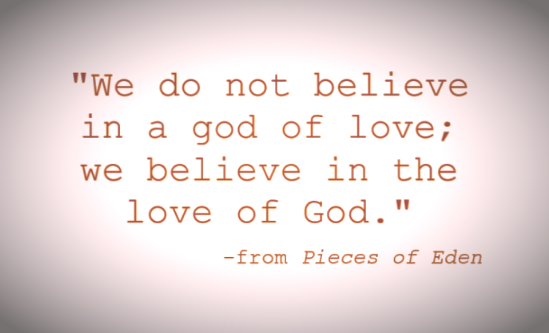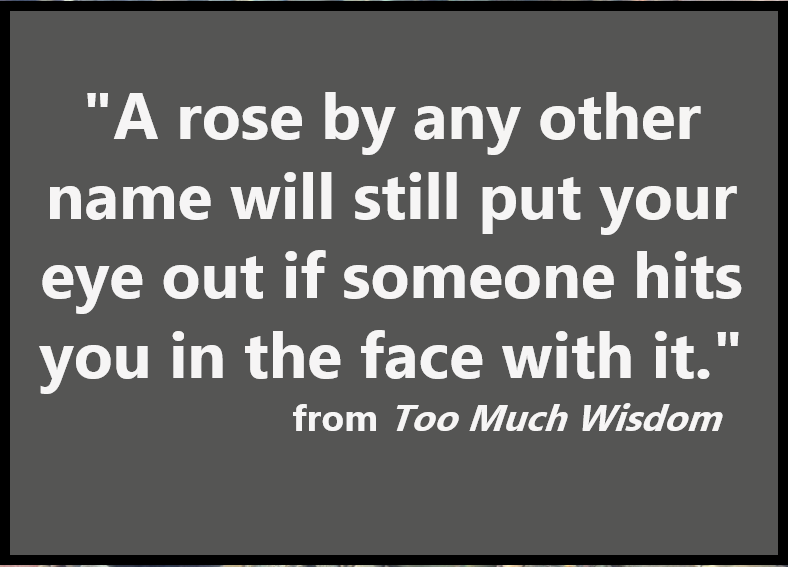|
This is going to be a little raw.
There’s a part of me which hates whenever a program like AGT showcases handicapped performers singing or making music while everyone stands up in amazement and applauds them wildly. There’s a part of my heart that seethes with resentment at every single such performance; but not because of the performer – because of the audience. If you’ve read this far, you’ll wonder why I feel so strongly about it. The reason is simply that I have a daughter who’s severely handicapped. Being her father has taught me things I couldn’t ever have learned any other way. I know what it’s like to struggle to understand her needs, and to try to take her out in public, and to stay awake too late at night worried for her safety and be jerked awake too early in the morning to take care of her. And especially, I have seen many, many people out in public either stare at my daughter, or walk quickly away from her, or (on occasion) make extremely disparaging comments about how obnoxious they think she is. I’ve experienced all of those things, but I’ve never seen a group of perfect strangers applaud her. Here's the seed of my resentment: A person with an obvious disability stands on stage while the audience braces themselves for something they can’t imagine. A blind pianist? A deaf singer? A non-verbal comedian? For one moment, a person who struggles unbelievably to overcome daily life gets to be the center of attention, just because they are entertaining. Most of the people who are watching have no direct experience with handicapped family or friends. So in that coliseum, the audience finally looks at a handicapped (disabled? differently abled? I’m not even sure which adjective to use anymore) person with something besides curiosity, fear, or bemusement. The performer always triumphs (otherwise they wouldn’t have made it to that stage of the competition) and the audience always celebrates, and it turns out to be validating for the individual on stage. In fact, it may be something like a crowning achievement for them, and I’m so glad they get to experience that thrill. But for the audience... it reeks of hypocrisy. After all, they finally notice the marginalized, the suffering, the struggling ones in life, but only because they are entertaining. Meanwhile, millions who struggle to scrape through the suffering of their everyday life continue to elicit pity and revulsion from so much of the public. We’ll feel bad for you if we remember to think about you, but if you entertain us, we’ll applaud. It’s shallow but it’s inevitable, because it’s a reflection of how we treat celebrities in general. Some people with nothing more than looks or acting chops – or even just the honor of being famous – receive our attention and admiration when, in reality, their opinions and ideas are no more valid or important than the forklift driver you work with, the young lady handing you a hamburger through the drive-through window, or the old man standing inside the door at Walmart. We know you exist, but if you entertain us, we’ll applaud. Our priorities aren’t just out of whack; they’re a bog of misplaced preferences and habits, reinforcing our reflexive desire for mass-produced distractions. Those priorities will continue to mire us down unless we can derive some good from those shows. Fortunately, for the audience as well as the performer, there’s something powerful that we can gain from all of this, but only if we recognize it and embrace it. Because in those moments when the majority of the audience discovers – shockingly, amazingly! – that the forgotten and fragmented human beings around us are capable of great beauty, those who applaud are offered a brief, infinitesimal point of view which is normally reserved for God. In that moment the audience sees people who have often been classified as “a drain on society” or “a public menace” or “inconvenient” and they realize that those people have depth, and a kind of glory. They recognize that there is something profound which is intertwined with their identity as someone with a disability, but which is capable of reaching us through, and in spite of, our propensities. We look at weakness, and are astounded by something majestic. That feeling will only last for a moment, and the first time it happens is the most powerful. No matter how many times you re-watch the video on Twitter, you have to grab hold of it quickly right at the start. And then, you have to expand that sensation so that it grows to include The Rest. The blind children who can’t play piano; the deaf teenagers who can’t sing; the non-verbal, wheelchair-bound, drooling, seizing, loud, non-verbal, incomparable representatives of our most ignored and unknown fellow human beings. In that moment it might just be possible to extend the glory of the performer to The Rest of those who are normally marginalized in our society, and to see them the way God sees them. There is something deep down inside them which is glorious, and majestic, and noble, and amazing. And beautiful. And although a few such blessed individuals have the ability to find that special key which unlocks the secret of their greatness so that everyone can see it, most of them don’t. Most of them will remain mysterious forever; a door without a key, a king or queen without a kingdom. If we can gain that discovery from the TV producers making all that money off of the hopes and dreams of contestants, then we can maybe turn our amazement into something more substantial than a hypocritical, momentary burst of approval. And if we do, perhaps we’ll deserve to share this world with those whom we have finally noticed; the ones whom God has been applauding all along.
0 Comments
Leave a Reply. |
Click on the link to go right to Josh's Amazon Author page.www.amazon.com/Josh-McFarland/e/B0868TJ4CP/ref=dp_byline_cont_book_1 Archives
February 2021
Categories |
Site powered by Weebly. Managed by Hostgator




 RSS Feed
RSS Feed